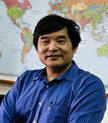五、學術專題演講
講 員 |
李
鎮
宜
教授
|
| |
現職:交通大學電子工程學系教授、
智慧電子國家型科技計畫共同主持人
經歷 :交通大學研發長、國科會晶片中心主任、
國科會工程處微電子學門召集人
|
講 題:
|
CMOS-based Smart
Sensors for Big Data in Medicine |
時 間: |
102
年
5月18日(六)
9:30 ~ 10:30 |
|
Abstract: |
With the advances
of ICT infrastructure and bio-sensing silicon solutions,
in-hospital medical cares are moving toward home-care or
even mobile health-care services. To meet this medical
service trend, it is necessary to provide smart sensing
devices which can sense vital signals and detect decease
syndromes by taking user’s behavior into account. In
addition to detection accuracy, low-power with unique
features should be addressed when designing integrated
circuits for this purpose.
In this talk, 2 chip
solutions will be presented for prevention medicine (PM). One is
a multi-channel cardiac signal processor (CSP) for ECG
extraction and syndrome detection, the other is a
field-programmable lab-on-a-chip (FPLOC) which is designed for
bio signal detection with microfluidic operations. The
multi-channel CSP, integrated with sensor interfaces, is
designed for mobile healthcare applications. Applied with
dedicated processing engines, the CSP extracts critical cardiac
signal features based on compressed data with 90% storage
reduction, while keeping the data and wireless link secure.
Besides, the biopotential and capacitive sensor interfaces
enhance the CSP functionality with least power overhead.
Implemented in a 90nm CMOS technology, the CSP consumes
22.6-46.5μW at 0.5/1.0V in different monitoring configurations.
The FPLOC integrates a set of basic operations on an array of
2-dimenional microelectrodes. Furthermore both control and
detection functions are realized under each microelectrode,
leading to a scalable design with limited I/O. Implemented in
0.35um CMOS 4-metal process, this FPLOC achieves 900
microelectrodes with a capacitance-to-digital measurement window
in 3.2mm2
and performs droplet moving at 1KHz and position detection at
1MHz.
Demonstration
examples with these 2 chips will also be shown to highlight
their potential applications in emerging PM devices and Big Data
in Medicine.
|
|
李鎮宜教授個人簡歷 : |
 Chen-Yi
Lee
is a professor in the Department of Electronics Engineering,
National Chiao Tung University, Hsinchu, Taiwan, and currently
serves as the Deputy Program Director of National Program of
Intelligent Electronics. Professor Lee received the B.S. degree
from National Chiao Tung University, Hsinchu, Taiwan, in 1982,
and the M.S. and Ph.D. degrees from
Katholieke
University Leuven (KUL), Leuven, Belgium, in 1986 and 1990,
respectively, all in Electrical Engineering. Chen-Yi
Lee
is a professor in the Department of Electronics Engineering,
National Chiao Tung University, Hsinchu, Taiwan, and currently
serves as the Deputy Program Director of National Program of
Intelligent Electronics. Professor Lee received the B.S. degree
from National Chiao Tung University, Hsinchu, Taiwan, in 1982,
and the M.S. and Ph.D. degrees from
Katholieke
University Leuven (KUL), Leuven, Belgium, in 1986 and 1990,
respectively, all in Electrical Engineering.
February 1991, he
joined the Department
of Electronics
Engineering and from 2003-2006, he was the chairman. He was the dean of
office of research and development in 2007-2010, National Chiao
Tung University, Hsinchu, Taiwan. During 2000-2003, he was the
director of National CHIP Implementation Center, Taiwan. During
2003-2005, he was the coordinator of Microelectronics Program of
Engineering Division, National Science Council, Taiwan.
Dr. Lee is currently
serving as IEEE A-SSCC
TPC member, IEEE VLSI Symposium JFE Circuits Program Committee
member, and IEEE TCAS-II Associate Editor. He was the program
committee member of IEEE ISSCC in 2004–2006, DATE TPC member in
2006-2007, and the Past-Chair of Taipei Chapter of IEEE Circuits
and Systems (CAS) Society. He received the Award of Outstanding
on Technology Licensing in 2007, 2008 from National Science
Council, and 2009 from Ministry of Economic Affairs. In 2009, he
received the Outstanding Research Award from National Science
Council.
|
|